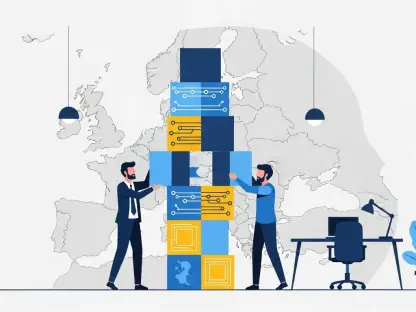In an era where data breaches and privacy scandals dominate headlines, imagine a world where sensitive information remains secure even on public digital platforms, allowing industries like finance and healthcare to innovate without fear of exposure. Blockchain technology, often hailed as a cornerstone of decentralized systems, struggles with a critical flaw: the transparency of public ledgers that leaves personal and transactional data vulnerable. This pressing challenge has spurred a groundbreaking collaboration between the Midnight Foundation and Google Cloud, aiming to redefine privacy standards in blockchain through advanced zero-knowledge proof technology. This report delves into how this partnership could transform the landscape, addressing long-standing barriers and unlocking new possibilities for regulated sectors.
The Current Landscape of Privacy in Blockchain Technology
Blockchain technology has emerged as a transformative force across industries, offering decentralized solutions for everything from financial transactions to supply chain management. However, a significant hurdle persists in the form of privacy, as most public blockchains operate on transparent ledgers where transaction details are visible to all participants. This inherent openness, while fostering trust through visibility, poses severe risks for sensitive data, particularly in sectors bound by stringent regulations.
The limitations of such systems are starkly evident in industries like healthcare, where patient confidentiality is paramount, or finance, where personal and transactional privacy is non-negotiable. Public blockchains often fail to meet compliance requirements, deterring adoption by enterprises that cannot afford to expose proprietary or personal information. This gap has created a pressing need for solutions that balance transparency with data protection, pushing privacy to the forefront of blockchain innovation.
Key players like the Midnight Foundation and Google Cloud are stepping into this arena with a focus on privacy-first approaches. The growing demand for secure digital frameworks has elevated the importance of technologies such as zero-knowledge proofs (ZKP), which enable verification of data without revealing the underlying information. As a game-changer, ZKP offers a pathway to safeguard privacy while maintaining the integrity of blockchain systems, setting the stage for broader enterprise adoption.
Unveiling the Midnight-Google Cloud Partnership
Core Objectives and Innovations
At the heart of the collaboration between the Midnight Foundation and Google Cloud lies a shared mission to build a privacy-first infrastructure for blockchain applications. This partnership focuses on integrating zero-knowledge smart contracts into Midnight’s network, a blockchain designed for programmable privacy and selective disclosure. Such innovations aim to empower organizations to handle sensitive data securely across diverse use cases.
In practical terms, Midnight’s architecture enables transformative applications in regulated sectors like finance, where private trading and cross-border payments can occur without exposing critical details. Similarly, in healthcare, patient data can be shared for research purposes while preserving individual privacy, and in government, verifiable credentials can be issued without compromising citizen information. These capabilities position Midnight as a pioneer in turning privacy from a barrier into a strategic asset.
Google Cloud plays a crucial role by providing scalable infrastructure to support Midnight’s network, including operating validators and leveraging Confidential Computing to ensure data remains protected even during processing. This synergy enhances the security of zero-knowledge systems, preventing unauthorized access by any party, including cloud providers. Together, these efforts aim to create a robust foundation for developers and enterprises seeking to innovate within strict privacy constraints.
Market Impact and Growth Potential
The implications of this partnership extend far beyond technical advancements, promising to accelerate blockchain adoption in industries previously hesitant due to privacy concerns. By addressing data protection challenges, Midnight and Google Cloud could unlock significant opportunities in regulated markets, where compliance often dictates technology choices. This collaboration is poised to catalyze growth in privacy-focused applications over the coming years.
Analysts anticipate that the integration of zero-knowledge technology into mainstream blockchain solutions will drive a surge in enterprise interest, particularly as data protection becomes a competitive differentiator. From now through 2027, the market for privacy-first blockchain tools is expected to expand rapidly, fueled by demand from sectors needing secure digital systems. This trend underscores the potential for Midnight’s framework to become a standard in sensitive applications.
Looking ahead, the mainstreaming of ZKP technology could reshape how industries approach data security, encouraging broader experimentation and development. The partnership’s emphasis on scalable and accessible infrastructure suggests a future where privacy solutions are not just niche offerings but integral components of digital ecosystems. This forward-looking vision highlights the transformative market potential of such collaborative efforts.
Addressing Privacy and Security Challenges in Blockchain
Public blockchains face substantial obstacles when it comes to data exposure, as their transparent nature often conflicts with the privacy needs of regulated industries. Compliance with laws governing data protection remains a persistent challenge, limiting the applicability of traditional blockchain systems in environments where confidentiality is critical. These barriers have slowed adoption among enterprises wary of regulatory repercussions.
The Midnight-Google Cloud partnership tackles these issues head-on by embedding privacy tools directly into the blockchain protocol, ensuring sensitive information remains shielded. Midnight’s zero-knowledge framework, combined with Google Cloud’s security measures such as Mandiant’s threat monitoring and incident response capabilities, offers a fortified environment for developers and businesses. This dual focus on privacy and security addresses core vulnerabilities that have long plagued public ledgers.
Despite these advancements, challenges remain in achieving widespread adoption of privacy-first systems, including technological complexities and the need for user education. Strategies to overcome these hurdles may involve simplifying integration for developers and providing robust training resources. Continued investment in accessible tools and collaborative ecosystems will be essential to bridge the gap between innovation and practical implementation in diverse industries.
Navigating the Regulatory Environment for Privacy Solutions
The regulatory landscape for blockchain and privacy technologies is complex, with stringent requirements varying across sectors like finance, healthcare, and government. Compliance with data protection standards, such as those governing personal information and transactional security, often dictates the feasibility of technology adoption. Navigating this environment demands solutions that align with legal frameworks while maintaining operational efficiency.
Midnight’s privacy framework is designed to meet these strict standards by enabling selective disclosure and ensuring data remains confidential even during transactions. This approach facilitates compliance in industries where regulatory oversight is intense, allowing organizations to leverage blockchain benefits without risking penalties. The ability to tailor privacy settings to specific requirements marks a significant step toward broader acceptance in regulated markets.
Google Cloud’s secure infrastructure further supports compliance by providing tools and services that adhere to global security benchmarks. Features like Confidential Computing ensure that data protection extends to all stages of processing, aligning with mandates for safeguarding sensitive information. This combination of protocol-level privacy and enterprise-grade infrastructure positions the partnership as a leader in addressing regulatory challenges facing blockchain adoption.
The Future of Privacy-First Blockchain with Midnight and Google Cloud
Emerging trends in privacy technology point to a growing reliance on zero-knowledge frameworks as a cornerstone of secure digital systems. As industries grapple with escalating data protection demands, the potential for wider adoption of such solutions becomes increasingly evident. This partnership could serve as a catalyst for integrating privacy-focused tools into mainstream blockchain applications over the next several years.
Beyond immediate applications, the collaboration between Midnight and Google Cloud has the potential to disrupt traditional blockchain models by prioritizing data protection at the protocol level. This shift may inspire future innovations, encouraging other players to explore privacy as a core feature rather than an afterthought. The ripple effect could redefine how decentralized systems are designed and implemented across various domains.
Additional factors, such as developer empowerment through initiatives like the Google for Startups Web3 Program, will likely fuel this evolution by providing resources and support for experimentation. Coupled with rising demand for privacy solutions amid global regulatory shifts and economic pressures, these elements suggest a dynamic future for blockchain technology. The emphasis on scalable, secure platforms positions this alliance to influence long-term industry standards.
Conclusion: A New Era of Privacy and Innovation
Reflecting on the insights gathered, the collaboration between the Midnight Foundation and Google Cloud emerges as a pivotal force in reshaping blockchain privacy. The integration of zero-knowledge technology with robust infrastructure tackles critical vulnerabilities, paving the way for secure applications in regulated sectors. This alliance demonstrates a clear path toward balancing transparency with data protection.
As a next step, stakeholders across industries are encouraged to explore partnerships and tools that prioritize privacy at the foundational level. Investing in developer education and accessible platforms proves vital for scaling adoption, while continued alignment with regulatory demands ensures sustainable growth. These actionable measures offer a roadmap for harnessing privacy innovations effectively.
Looking beyond immediate outcomes, the focus shifts to fostering an ecosystem where privacy and security become intrinsic to digital systems. Encouraging cross-industry collaboration and supporting emerging technologies holds promise for addressing future challenges. This evolving landscape underscores the importance of sustained commitment to privacy as a driver of trust and innovation in blockchain technology.









